Whenever the conversation turns, with friends, to the best RPG campaigns that we’ve either run or played, my stock answer seems to vacillate between a Gary, Indiana-focused Vampire: The Masquerade campaign, and a Dresden Files campaign that I ran a good few years ago. Long-time readers will know of my love of all (well, most) things White Wolf and of the World of Darkness in particular. Many will also be aware of my love of FATE, the system on which the Dresden Files RPG is based. I covered both in my rundown of my favourite RPG publishers.

The particular Dresden Files campaign that I pick out as my favourite earns that status on a few different fronts. First, and probably most importantly, a fun, dynamic group that really bought into the game, the setting, and the story that we were telling together. Players who played their characters, rather than just playing the game, if that makes sense. I think that’s a huge factor in any RPG being fully enjoyed in the spirit in which it is intended.
The next front is the setting. Jim Butcher has now written 17 core novels in the Dresden Files series, plus a number of short story collections. It’s a very well-established series with an extensive cast of secondary and tertiary characters, settings, themes and motifs, villains, and other assorted paraphernalia. There was a TV show…
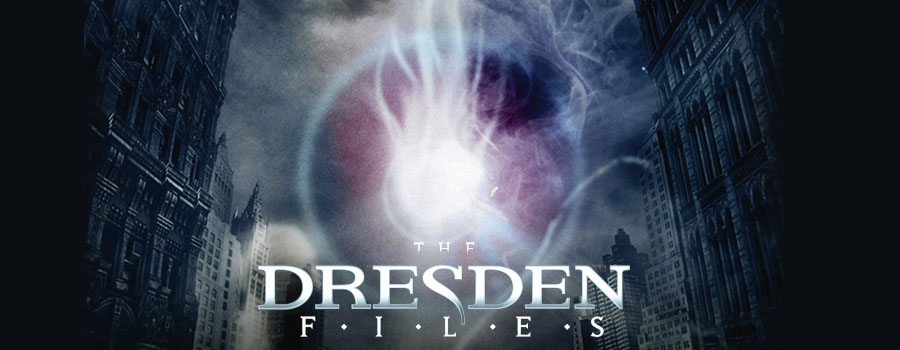
Let’s not discuss the TV show.
The books are fantastic. The central character of Harry Dresden is a hero, but he’s flawed, relatable, and tired. No wonder. He’s a thoroughly compelling character and the use of magic in the series, mostly demonstrated through his own actions, is interesting and follows a firm(ish) set of fixed rules. Things break the rules, but isn’t it ever thus? Those things that do appear to break the established rules are also treated with the gravity that such an occurrence would demand. As an aside, the character of Harry and the books more generally are voiced fantastically by the talented James Marsters. That man is Harry Dresden to me.
The secondary characters are the real highlight of the series for me. They create an ecosystem around the core character that grounds him in the setting, gives stakes when his friends are at risk, and humanises a character who has the potential to be both inhuman and terrifying.
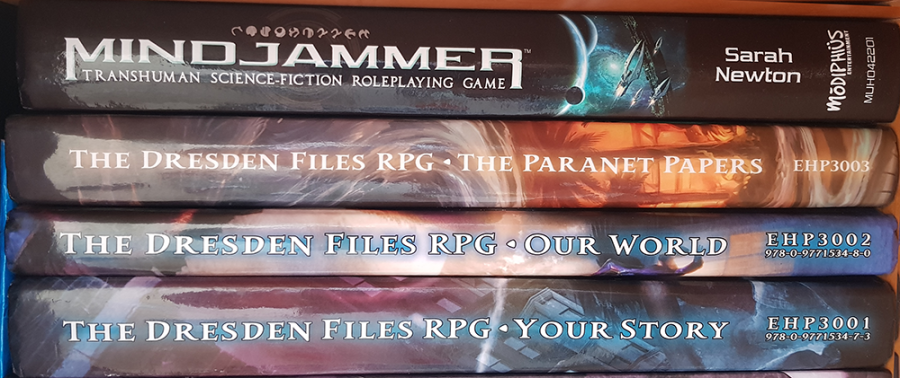
Ignore the Mindjammer book. It was nearby!
In the game, this is exemplified in the “Our World” book. This is the setting book for the game, introducing the characters, locales, allies, and antagonists. It’s a great book for fans of the series even if they don’t play the game, as it gives nice, potted profiles of various characters. It’s a fantastic dramatis personae. It also gives statblocks for these characters and their aspects. Aspects are a really interesting element of the FATE ruleset that I’ll discuss a little later on.
The books themselves are presented wonderfully. They are designed as if to be artifacts from the series itself. There are notes in the margins and in faux-sticky notes throughout the book that act as a commentary or conversation about the content. Sometimes these can contain good advice; more often they are for entertainment as characters (usually Harry Dresden or his familiar, Bob the Skull) dispute or debate the written information as being incorrect, mistaken, or misrepresentative, from their point of view. I love this.
I’d like another book to bring the series up to date, particularly after the explosive events of the most recent pair of books, Peace Talks and Battle Ground. Such a book would contain, I’d hope, new and updated character profiles, and some new, original material. The Paranet Papers did this well for the time it was released, and I really love the Las Vegas and Everglades (Neverglades!) settings that it introduced. I’ve used the Las Vegas setting for a couple of campaigns, myself.

The final element that makes this game so fantastic is the underlying system, FATE. This is a rules-light system that I feel encourages and rewards roleplaying, rather than just min-maxing specific stats and throwing dice around. Skill checks are taken against a ladder, showing the level of mastery a character has over specific skills and abilities.
The bit of the FATE system that really sings for me are the Aspects. I love the Aspects system. I mentioned above about players being encouraged and able to play their characters, rather than just mechanically play the game. Aspects foster this approach wonderfully. Aspects define key elements of your character, allowing you to draw on bonuses for playing to your character’s personality, but also allowing the GM to compel you to act in line with your established characteristics in specific situations. The FATE SRD describes aspects thusly:
“Aspects are what make Fate go. They’re the clearest, most interesting method for describing who your character is, and they form the basis of the fate point economy. Invoking an aspect gives you a certain amount of control over your destiny, a way to mitigate the caprice of the dice. Compels are the GM’s best friend when it comes to creating story and situation, injecting drama into a scene, or just plain throwing a wrench into the players’ plans.”
When playing D&D with children, I’ve had some success in incorporating an aspect-like system into the game to support roleplaying. Aspects are such a core part of character design in this game, and in FATE more generally. They are also incredibly flexible and completely customisable; you literally make them up. This gives you the ability to make very specific, very interesting heroes, built upon the broad archetypes (mantles) given in the book. It’s really fascinating, and it works so well.
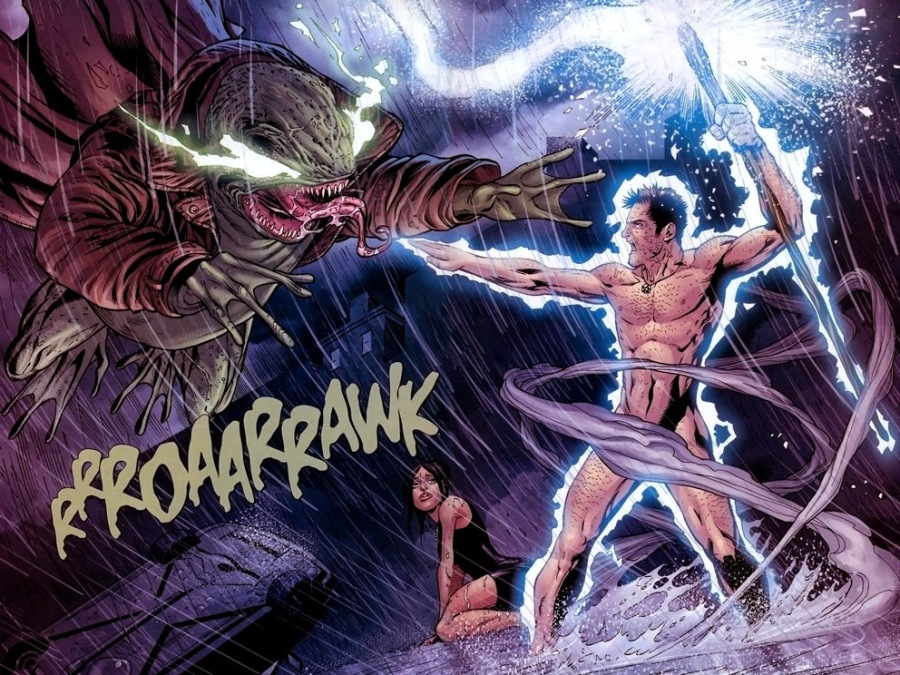
I love this game. Let’s not mince words and play at being coy; I love it. It’s a perfect fusion of game design and graphic design on the part of Evil Hat and world-building on the part of Jim Butcher. The game is so rules-lean that there’s nothing to get hung up on and no unnecessary jankiness. The lack of jank is refreshing when I find myself mostly playing (still pretty damn good) games of D&D.
One of my favourite parts of the game is actually the character and setting creation. In some games, like D&D, I’d be happy to go away and have players create their characters in isolation. Is this the best way to do it? No. I think communal character creation leads to a better group. In Dresden Files, I’d never want anyone creating a character alone. The use of aspects allows defined interactions between player characters, and the collaborative creation of the setting (say, a city) ensures that both players and setting have aspects that interact, grounding the character in the city. What is Harry Dresden without Chicago? Characters matter. The setting matters. The connection between the two is often overlooked but is really crucial for a sustainable, living game. This game explicitly fosters that connection.
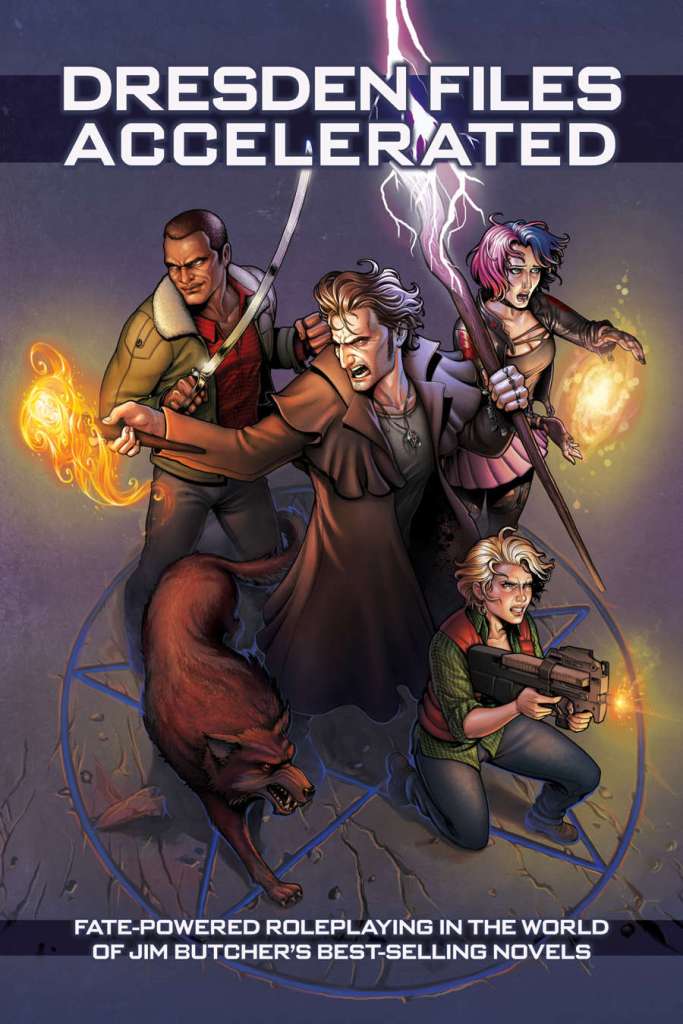
Something to add at the end is that in addition to the two core books (Your Story and Our World) and the expansion (The Paranet Papers) for the Dresden Files RPG, there’s also a spinoff. Dresden Files Accelerated is based on FATE Accelerated. Whilst FATE is quite a simple, streamlined system, FATE Accelerate is an even more streamlined game. This book captures that streamlined, simple approach. It also maintains the personality of the original game, being presented once again as an in-universe artifact with character commentary throughout.
I found that I generally prefer the larger, original game. It does more for me. That said, when I played online during one of our Covid-mandated lockdowns, I felt that the Accelerated edition was more manageable in that digital environment. Both have their place, definitely.
My view is pretty clear. Go play Dresden Files.
No review copy was provided, and this review is based on pretty extensive play over a number of years. If you are interested in the game and wish to support NoRerolls, here are some DTRPG affiliate links to pick up the game(s):

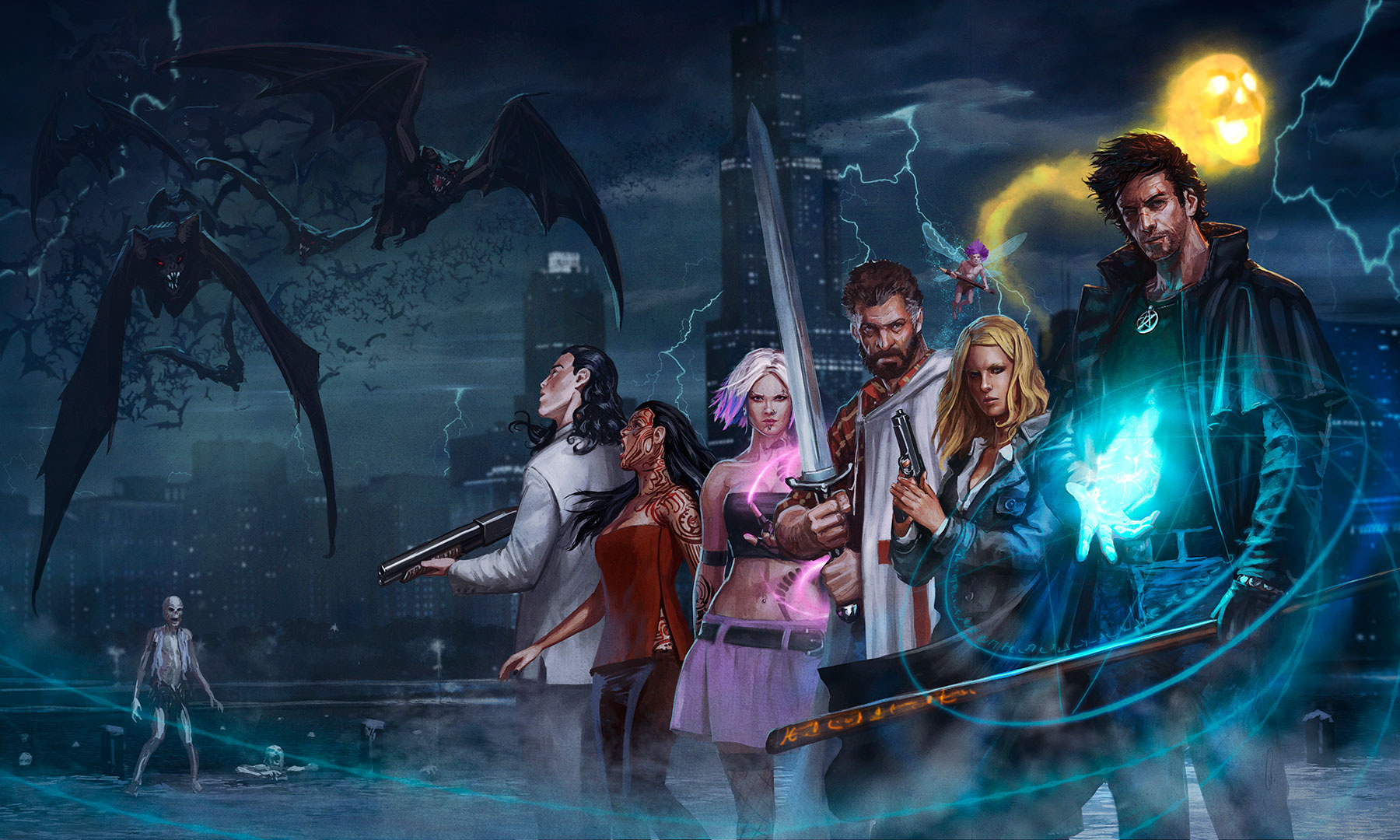
29 Comments